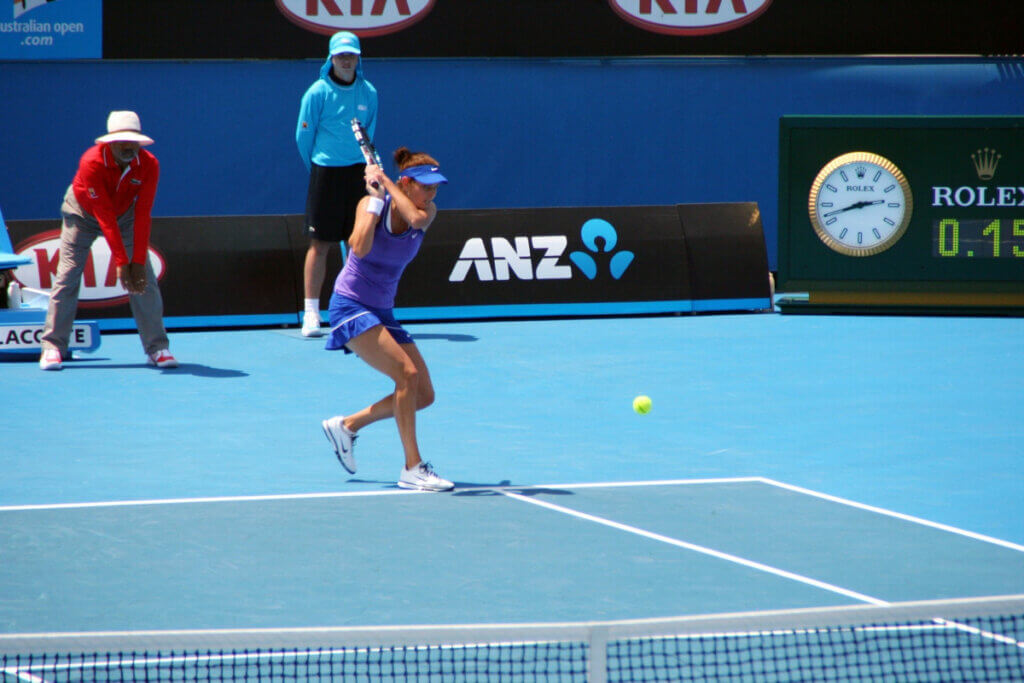Cheating in Tennis
posted on: February 28, 2022
author: Brian Lomax, Ed.D.

Cheating and unethical behavior in tennis is not a new phenomenon, but it has received more attention in recent years, especially in college tennis. Perhaps this is because many college matches are streamed live, and the bad calls are plain to see. Jon Wertheim of Tennis Channel and Sports Illustrated wrote about cheating in college tennis in this article from 2019 (scroll to point number 5 in the article). Additionally, this Twitter thread was spawned after a player at a top 10 Division I university made some egregious line calls that were captured on video. It’s a shame to see players act this way.
Cheating, along with other unethical practices such as arguing about rules, accusing others of cheating to distract them, deliberately changing the score, and taunting opponents, can suck the joy out of the game. And to be clear, this isn’t just a college tennis problem. It happens at all levels of the sport including junior and adult tournament tennis, and adult league tennis. There is no honor in acting unethically, and it goes against the principles of competition. So, why does it happen and what can we do about it?
Players Are So Competitive
One common explanation of cheating is that players are so competitive, and they will do whatever it takes to win. Only half of that explanation is true, and we need to be very clear on this point. Players who cheat are NOT competitive; they just like winning. Let me repeat that: players who cheat are NOT so competitive. Being competitive and wanting to win are not the same, and they should not be conflated as such.
What It Means to Be Competitive
Let me explain. There are three components to being competitive and they are presented below in order of importance (Gill & Deeter, 1988):
- Wanting to compete and to enjoy the process of competing
- Viewing competition as a means of improving and mastering the sport
- Having a strong desire to win
Wanting to win IS a critical part of being competitive, but it is third in order of importance. Players who are truly competitive understand that competition is filled with challenges and obstacles, and true champions embrace those challenges and go through them. That’s what forges them into champions. They have the courage to deal with adversity and to do what is right. Once true competitors overcome a particular challenge, they progress. They will handle that challenge better and better in the future. And so it will go with all obstacles they face.
The Cheater
In contrast, the cheater avoids the challenge of playing the match fairly and instead takes shortcuts to winning. Therefore, cheating is a cowardly act. Players who cheat likely will not become great champions because they lack the courage to play with fairness, respect, and integrity. They are willing to compromise their personal character to win a tennis match. That’s sad. I realize that this may sound harsh, but it is true nonetheless.
By not facing up to challenges, the cheater’s ability to progress as a tennis player is limited because the fear of losing outweighs the desire to be great. Therefore, cheaters are not “so competitive.” They value winning today over becoming a great champion. They choose the easy way; the way that does not require courage, fight, and grit. However, excellence is not achieved through shortcuts.
With all of that being said, I do realize that at the junior level, there could be other factors as to why players cheat. Pressure from coaches, parents, etc., can be daunting. Cheating to win might be the best strategy to avoid the brutal car ride home or other unpleasant consequences of losing. It is truly unfortunate for junior players to be put in this position.
Who Do You Trust?
If you’re on a college tennis team and the team score is 3-all, and the last player on court for your team is someone who cheats, are you really, really going to trust that player to come through for you? I wouldn’t. Players who take shortcuts all the time cannot be trusted to consistently succeed under pressure. They don’t have the competitive character to do it. They have come to rely on taking the easy way to winning.
Can Better Officiating Solve the Problem of Cheating?
To address rampant cheating in college and junior tennis, it has been suggested that officials and the various governing bodies need to do a better job enforcing the rules and integrity of the sport. Although that is certainly true, it is not a solution for cheating. Better officiating does not address the root cause of this behavior. It’s an after the fact, enforcement approach. Additionally, officials are human and therefore not perfect. Mistakes will be made, and sometimes match officials make the situation worse. So, this is a band-aid at best, and it does not address the myriad situations in competitive tennis in which officiating is not available.
 Does Sport Build Character?
Does Sport Build Character?
Before we tackle the root cause of cheating in tennis and propose a solution, we need to address a fundamental question: does sport (tennis) build character?
Your initial reaction may be something like, “Yes, absolutely! Tennis teaches people to work hard, be independent, deal with challenges, etc.” But if you think about the question a bit more, you begin to realize that the answer is more nuanced than at first glance. If tennis – the sport – built character, we would not have rampant cheating and unethical behavior in the game. The majority of players would compete with respect, honor, integrity, courage, and fairness, and they would do this in challenging pressure situations. To be clear, many players do compete this way, but many others do not. Given that we see examples of good character and poor character in competitive tennis, the best we can say about the sport is that it is neutral on the issue of building character.
What Does Build Character in Tennis?
Now that we understand that tennis is neutral on the issue of building character, we can address what does influence player behavior on court – the training and motivational environment designed by coaches and parents. This is how player character, good and bad, is built. If the team or academy environment (designed and promoted by coaches) emphasizes winning over all other concerns, players are much more likely to cheat and act unethically. When coaches emphasize character first, and then playing to win, players are more likely to behave ethically, embrace challenges, and compete like champions.
At the Division I level of college tennis, winning is obviously important, and for most programs, it’s the only thing that matters. When coaches have a win at all costs approach, players tend to adopt that attitude, and cheating is often the result (Priest et al., 1999). Unfortunately, this behavior can extend beyond the tennis court, which is why the issue of cheating in tennis is so important from a character-building perspective. It can affect conduct in other areas of our lives. It’s not just an issue restricted to tennis.
Winning With Character
The New Zealand national men’s rugby team, aka the All Blacks, has a motto: Better people make better All Blacks (Hodge et al, 2014). To be clear, this is a national team that wins more than 80% of its fixtures, so they have credibility when it comes to success. The management and team members of the All Blacks believe that people of good character are better competitors, better teammates, and are more trustworthy. Better people don’t make excuses and they don’t take shortcuts. We can learn from the All Blacks and restate their motto as “better people make better competitors.” Their success demonstrates that you can compete with good character and win too. They are not mutually exclusive. Former UCLA men’s basketball coach, John Wooden, whose teams won 10 NCAA championships, believed the same.
“Be more concerned with your character than your reputation, because your character is what you really are, while your reputation is merely what others think you are.” -John Wooden
What Coaches Can Do To Build Character
To reduce cheating in tennis, coaches should prioritize building character as part of their coaching mission and programs. And that must go beyond words and slogans. It must incorporate action. Personally, I would love to see the coaches in the Power 5 conferences and the Ivy League embrace this mission in college tennis. It would make a huge difference to the sport if these coaches said “No” to cheating and unethical behavior.
If the coaching mission is to build good character in players, then the following should be emphasized in the training and motivational environment:
- Learning over results
- Good sporting behavior over results
- Courage to deal with challenges fairly and ethically
- Respect and honor for the opponent
- How to enjoy competing (the battle)
- Recognizing good sporting behavior by players
- Discussions about the importance of good character and competitiveness
- The core values of the program
By making a commitment to build character in players, coaches are sending a message that ethical behavior matters, and they expect their players to adhere to the standards of good sporting behavior. Winning with honor and integrity is far better than winning through cheating. Players can be proud of how they competed, regardless of result, and they will become better people in the process.
Teach Life Lessons
When cheating does occur, there must be consequences, regardless of how good the player is. Otherwise, the coach isn’t building character; he or she just cares about winning. At times, this can be a difficult decision because suspending a player could affect the team’s win/loss record. But if the coach’s mission is to teach life lessons and to build character in players, the decision to act appropriately is easier (Vallée & Bloom, 2016). It is a moment to decide what is more important: building character or winning (in the short-term)? It’s a moment for uncommon courage – the courage to do the right thing. This can be applied to club pros working with adult league teams as well.
If coaches are not willing to make character building a meaningful part of their program, cheating and poor behavior will continue. All other measures to mitigate it will be band-aids and nothing will substantially change. However, if more coaches can commit to the path of building character in their players so that they can become great competitors, cheating in the sport will be reduced. It will never be fully eradicated, but we will see more instances of positive sporting behavior than we have seen in the past. Character building is a worthwhile mission, and it will bring more honor and joy to playing this great sport.
References
Gill, D. L., & Deeter, T. E. (1988). Development of the sport orientation questionnaire. Research Quarterly for Exercise and Sport, 59(3), 191-202.
Hodge, K., Henry, G., & Smith, W. (2014). A case study of excellence in elite sport: Motivational climate in a world champion team. The Sport Psychologist, 28, 60-74.
Priest R. F., Krause, J. V., & Beach, J. (1999). Four-year changes in college athletes’ ethical value choices in sports situations. Research Quarterly for Exercise and Sport, 70(2), 170-178. DOI:10.1080/02701367.1999.10608034
Vallée, C. N., & Bloom, G. A. (2016). Four keys to building a championship culture. International Sport Coaching Journal, 3, 170-177.
About the Author
Dr. Brian Lomax founded PerformanceXtra™ in 2009 with a mission of helping athletes achieve their goals and their top performances more consistently through a progression of mental skills that enables them to focus on what is truly important.
Learn more about the author: https://performancextra.com/brian-lomax/

